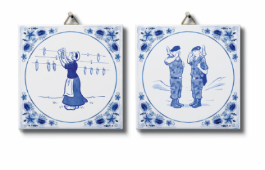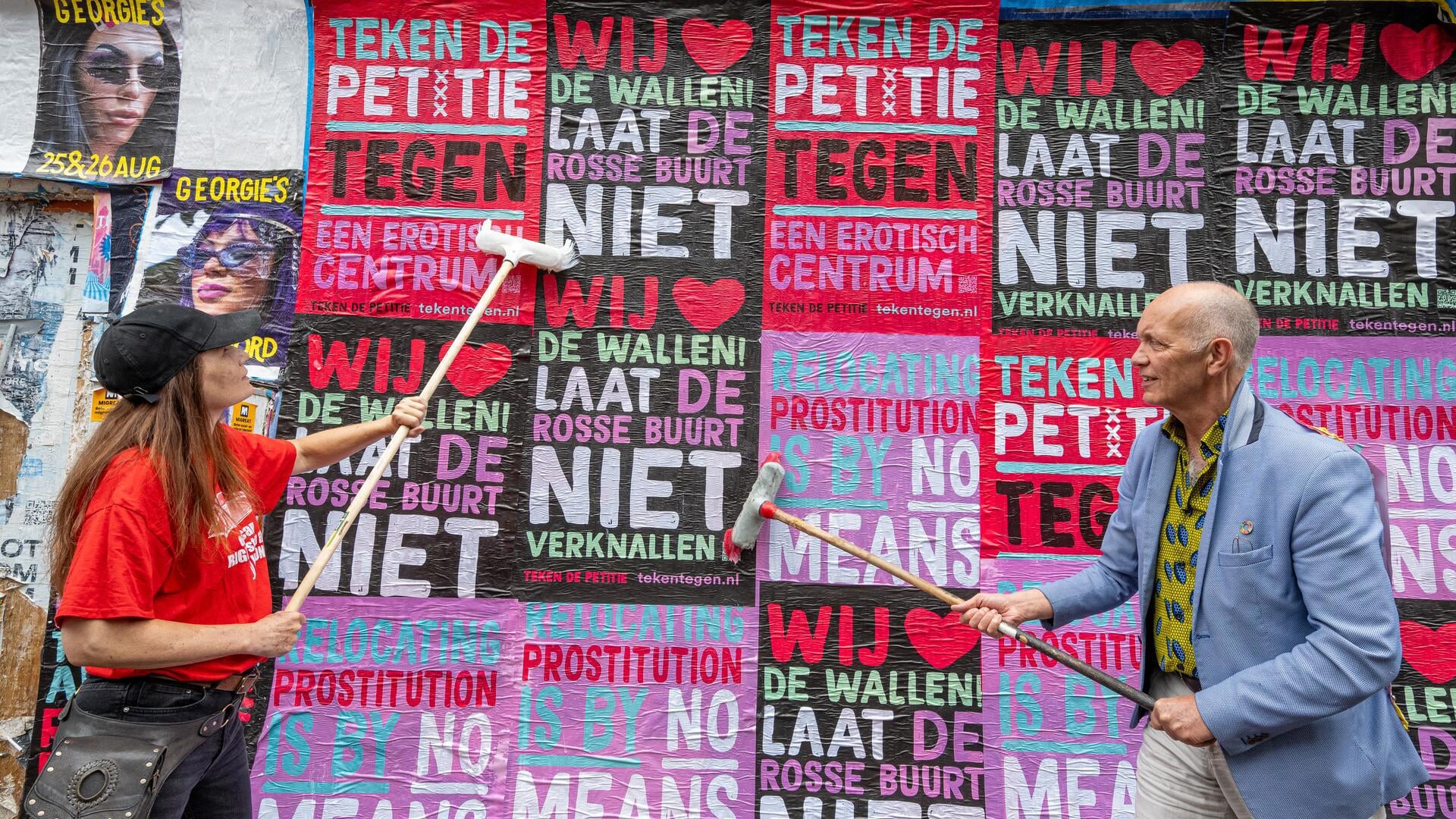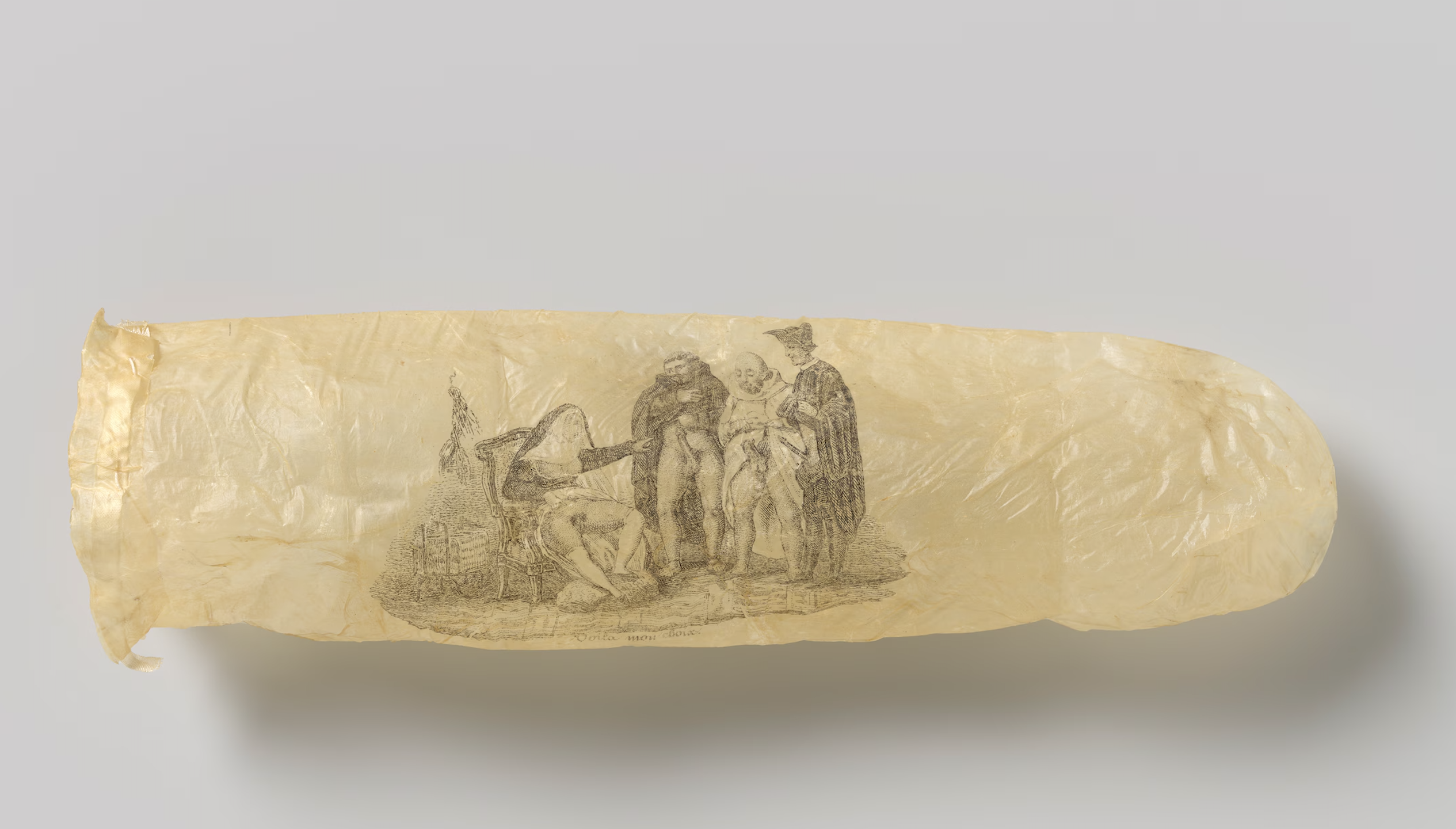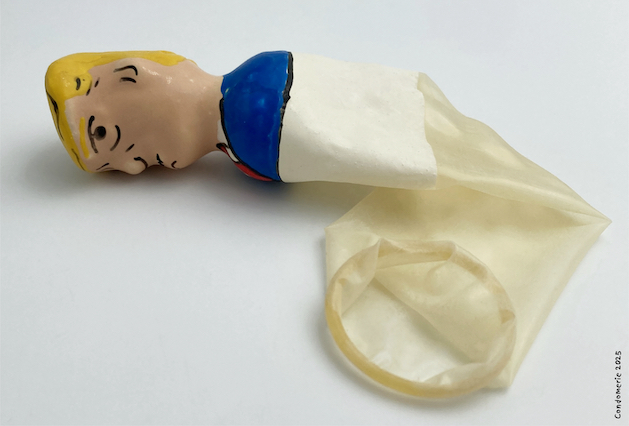Condoms and the armed forces

Article in Checkpoint no. 08 - December 2021
Condoms and the armed forces
To make sure you stay healthy. To keep your weapon clean. To not make anyone pregnant. To frighten your enemy. Condoms have been used in all sorts of ways by the armed forces through the ages. Some stories about condoms in military life.
Text Sanne van de Grift Illustrations Tobias Dahmen
Early 20th century
Condoms were very inflexible and had a thick rubber edge. When they were scarce, they were washed after use and hung up on a washing line to dry. A bit of powder – and they were ready for the next time.
First World War
Pragmatic military commanders recognised the link between sex and morale. So the Germans and the French set up their own brothels on the front line: with blue lights for officers and red lights for soldiers. An additional benefit was that it gave the commanders some control over the prostitutes’ health, containing the spread of sexually transmitted diseases to some extent. Soldiers being absent from duty because of these diseases was a problem that kept generals awake at night. After all, it was before the discovery of penicillin, so syphilis and gonorrhoea were incurable and caused excruciating pain.
Second World War
The Norwegian underground came up with a cunning trick. They treated condoms with itching powder and distributed them among the Nazis – who then spent days and days trying to find out what mysterious disease they’d caught. This went on for so long that German submarine launches were delayed as crews were incomplete. At the time, the US kept statistics of sexually transmitted diseases within the armed forces. If a battalion had many soldiers that were infected, it was considered war weary. Sometimes they were all sent home.
1945-1949
The Dutch soldiers who were sent to the Netherlands East Indies during their years of national service had a more sheltered upbringing than they would have had today. So in Indonesia they may well have seen a naked breast for the first time. A chaplain inspected educational films before they were shown to the soldiers, and often had sections about condoms cut out. The same man would often stand at the gate to take condoms away from boys who were going out. He thought they should just restrain themselves. Protestant chaplains were even more naïve. They seemed to think that if you prayed enough ‘that feeling’ would just go away. Military commanders took advice from medical staff and were much more pragmatic. They realised that providing condoms would prevent sexually transmitted diseases and maintain manpower levels. Military personnel also used the condoms to keep sand out of gun barrels, which saved time when they cleaned their weapons.
50s and 60s
The American army psychological operations unit (PsyOps) adopted a strategy that Alexander the Great had used, but for a lower part of the body. In 300 BC, Alexander the Great had told his armourers to make helmets that would fit 7-metre tall giants. He then left the helmets here and there in the villages he conquered, hoping this would spark wild rumours about his army. The Americans had condoms made that were 30 centimetres long and scattered them along the Ho Chi Minh trail. This was meant to frighten the Vietcong, challenge their masculinity, and make them feel inferior. There were soon a lot of stories going around about the size of African American soldiers’ genitals.
Early 90s
The AIDS epidemic was hitting communities hard all over the world. On their way to Cambodia, Dutch marines took some leave in Thailand. A government minister remarked that they would need to make sure they had enough condoms with them. Some of the troops were outraged by this, and paid for their own flights back to the Netherlands to go on leave.
2001
When the Netherlands sent both male and female soldiers on a mission to Afghanistan, there were soon rumours among the Afghans that the troops were planning to be there for a long time. The locals thought the Dutch had brought their own prostitutes with them. Later, the government minister Annemarie Jorritsma tried putting the option of sending prostitutes along with missions up for debate. It could prevent soldiers from “doing the wrong thing” with female colleagues or women near the military base. Trade unions didn’t think like the idea, instead arguing for shorter missions and leave between deployments.
Today (2022)
Soldiers don’t have as much contact with the local population as they did before. So any sexual contact is now at the compound, with other military personnel. Support services for military personnel no longer provide condoms for missions. It is each individual’s responsibility to do the right thing.
Dilemma
Theodoor van Boven from the Condomerie in Amsterdam explains how condoms reflect a dilemma in the armed forces: ‘Are you a moral crusader or do you want to keep your army healthy? The front line is very different to the home front. You could die. You often feel lonely. By being moralistic, and trying to take the erotic element out of everyday life, there is a risk of causing discontent. This could be internalised by soldiers, perhaps even leading to suicide. Or it could lead to aggressive behaviour, to something as bad as rape. The only time Condomerie was approached by someone from the armed forces was when a female soldier asked about female condoms. She was going on patrol in enemy territory. Male condoms have exactly the same protective function in the armed forces.
My father-in-law Jan Vilijn fought with the British troops in World War II and was later a commander at Leeuwarden air base. As a pilot in the 322 Spitfire Squadron, he had to shoot down V1 and V2 guided missiles. He once told me about the warnings on large posters in RAF walk-in clinic waiting rooms: England is facing three big dangers: the V1, the V2, and VD (venereal disease, the former name for sexually transmitted diseases). Then there was the so-called ‘short-arm inspection’ in the US and British armies, when soldiers had to drop their trousers to have their genitals checked for diseases or lice. The more sexually transmitted diseases, the less manpower.
My father was army chaplain in the Netherlands East Indies, working for 5-11 R1, the so-called Limburg Hunters Regiment. [Note from T. v. Boven: He was quartered at bases including TanjungPura district, Medan, Prapat, Samosir and Sibolangit LakeToba in Sumatra, later becoming field chaplain at WestJava in Bandoeng, and finally field chaplain for the K.N.I.L. soldiers and their families on the SS Ranchi during their trip back to the Netherlands in September 1950.] He was open-minded and pragmatic. In his attic, I found a booklet, printed in Batavia, called Pros and cons of soldiering. One of the chapters describes “a very difficult part of a soldier’s life”: how to deal with the other sex, with all kinds of examples of dangerous women in brothels and on the streets, and advice like “try to restrain yourself, your girl is back home in the Netherlands and you want to be healthy when you return”. I would never express an opinion on condom provision. Those boys and men at that time spent years away from home!’
Theodoor van Boven would like to hear from readers who know more about his father’s booklets.
theodoorvanboven@condomerie.com
With thanks to Gielt Algra, academic researcher at the Netherlands Veterans Institute, and to Theodoor van Boven, Condomologist at Condomerie in Amsterdam. Illustrations Tobias Dahmen. Translation Mandy Savage











